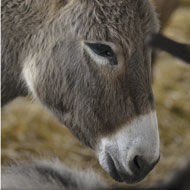Royals speak out for working animals

There are estimated to be 100 million working equines overseas.
HRH The Princess Royal has urged animal welfare organisations to work with human development groups to improve lives and conditions for those in developing countries in a speech at the 7th International Colloquium for Working Equids.
The British royal visited this year's colloquium on working horses - being hosted by World Horse Welfare at Royal Holloway, University of London this week - to discuss the vital impact these animals have on humans in developing nations, and the need to improve the welfare of both.
During her speech the Princess, who is president of both World Horse Welfare and Save the Children, highlighted the need for strong communication and collaboration between equine charities and the human development sector, saying: "Animal welfare is just as important as child welfare in the context of human welfare in developing countries depending upon the welfare of their horse.
"The horse's welfare is paramount because it is the horse who carries the child to his place of education or fetches the water for the family in place of the child which enables the child to go to school.
"The horse carries the child to medical attention should he need it, carries the mother to hospital while she is in labour and carries the vital food supplies so that mother can carry baby on her back instead of leaving baby alone at home.
"There is a real scope for animal welfare organisations to work together with human development organisations if we can work out how to get across to the more sceptical audience the value of the working animal to communities in the long-term, which I’m sure you will thrash out during the course of this event. I very much look forward to seeing the results of all your hard work.”
HRH Princess Haya, president of the International Equestrian Federation and another key speaker at the event, called for a focus on the health and welfare of working animals.
As an expert on the challenges of international human development as well as equestrian sport, she said: “I have seen how elite sport horses are greatly valued, while the working horse is almost invisible, despite their value to the livelihoods of many poorer countries. In most cases the people who depend on working equines do not have a voice and generally do not receive any assistance apart from that provided through development organisations.
"To these people, their horse, donkey, or mule may be the single most important thing in ensuring their livelihoods. It therefore seems natural that those working in human development and those in animal welfare should be working together to the same end.
"For example, a man in Phnom Penh uses his pony for collecting building materials and the income from that to feed his family. This pony is as important to him as a competition horse is to a rider competing in the Olympics. However, in equestrian sport, we recognise that for a horse to compete well its health, fitness and well-being is of paramount importance.
"To ensure this, in many countries we have access to a whole industry of skilled farriers, saddlers and vets. Working horses, ponies, donkeys and mules also need this care – but their needs are often unmet because of a lack of awareness of what their horses need, and a lack of skilled people to provide these services."
The colloquium has seen experts and representatives from 27 countries, including veterinarians, technical advisors, project managers, community development practitioners, academics, equine and human welfare organisations come together with their research and findings to discuss the barriers to fundamental changes in attitudes and practices towards working horses and the families they provide and care for.
Through presentations and discussions across two days in London, including a third practical day at a rescue and rehoming centre in Somerset, delegates are discussing how British charities and other organisations are improving the welfare of the estimated 100 million working equines overseas.
Roly Owers, chief executive of World Horse Welfare, who are sponsoring the event along with SPANA, The Brooke, The Donkey Sanctuary and World Animal Protection, says: “The hope is that we identify how much more these equines could contribute to poor communities, who rely on these working animals every day to survive, if their welfare needs were better understood.”
For more information visit www.worldhorsewelfare.org/colloquium2014.



 The RCVS has announced a new version of its 1CPD mobile app, with enhanced features for veterinary surgeons and veterinary nurses to record their continuing professional development.
The RCVS has announced a new version of its 1CPD mobile app, with enhanced features for veterinary surgeons and veterinary nurses to record their continuing professional development.